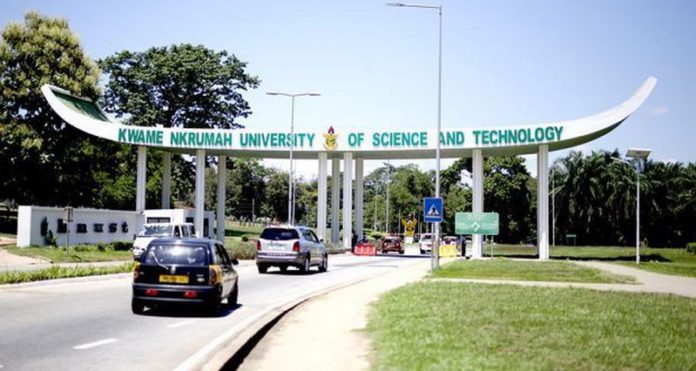There is some good news for lecturers and students of Kwame Nkrumah University of Science and Technology (KNUST) as the institution goes virtual with all academic work.
Students can now access the e-learning platform, known as Virtual Academic Space for free.
Originally used only by the Institute of Distant Learning, it’s been upgraded from one functioning feature to nine, with capacity for over 65,000 students.
JoyNews’ KNUST correspondent, Barkisu Mohammed reports.
At an Academic Board Meeting on May 4, 2020, there was a decision for end-of-semester assessment to be based on student average score of three to five written assignments per course.
It, therefore, became incumbent on the university management to make online learning easily accessible.
The virtual classroom feature now has, in addition, Online Exams, Video Chat and Conferencing as well as Webroom conference.
Others are Electronic Information Resources, Prempeh the Second Library Catalogue Institutional Repository, and Turn It In.
Deputy Director at the Institute of Distance Learning, Dr Ahmed Agyapong in KNUST says new servers and features were installed to facilitate the transition to the virtual class.
“Because of the corona virus outbreak leading to the subsequent closure of the universities we decided to digitise our system and then also bring our students to our virtual classroom to learn, before then it was used by only the distant learning students but it became necessary that we migrate all the regular students to also have their studies or complete the semester online,’’ he said.
“So we had to install new servers because the old servers were not big enough to accommodate over sixty-five thousand students of KNUST. Now you’ll realize that we have brought the entire university to our virtual space and we have now nine features before then we had only the virtual classroom. Once you are a student and you have your username and password you just log on, everything is there for students for free,” Dr Agyapong added.
The addition of Prempeh II Library to the facilities on campus comes, perhaps, with even greater excitement.
Dr Henry Kofi Mensah is Head of KNUST Department of Human Resource and Organisational Development.
“We also have the digitised library of the university, we chose to digitise it because in the corona period we do not need to cramp ourselves and assess various books in the library so we thought that we will digitise this place where students wherever they find themselves will be able to assess it with their credentials,” he explained.
“We also have the turn-it-in, it’s a plagiarism software because student will be submitting assignments and because we want to ensure that our students are ethical and they respect all academic requirement we have place this so that students can text the extent of similarities between their work and other peoples work,” Dr. Mensah stressed.
Meanwhile, lecturers who are unfamiliar with the virtual class platform are undergoing training to enable them access it with ease.
“Those lecturers who were not on the distance learning program were not familiar with the system so when all others joined there was the need to organise training, so far we have been able to train over two hundred lecturers so that they will be able interact with their students. More lecturers will be trained at their convenience, even those who have already been familiar with the virtual class can join the training so that they can up their skills,” said Dr Ahmed.
Prof. Samuel Sackey is a lecturer at the Mechanical Engineering Department and also Director at the Technology Consultancy Centre.
He lauded the new system though he is concerned about network challenges students face.
“The systems we have here are user friendly, the only challenges we face sometimes is when you have to write something then there are difficulties. Sometimes the students can’t see very clearly what you’re writing.
Other times, they don’t see anything at all. Sometimes the writing becomes blurred so these days I do write them and include them in the slides.”
“The problems that the students face have to do with their own network at their end. Not long ago one students called me and told me his slides have gotten stuck; they were not moving along with mine but other students were not having that problems; their slides were moving same with mine so we had to tell that person to check his network,” he recalled.
Senior Lecturer at the Department of Electrical Engineering, Dr. Emmanuel Anto, couldn’t agree more.
The only challenge had to do with the internet connectivity but other than that there is no challenge from my end,” he pointed out.
The Guardian newspaper in the UK earlier this year reported The London School of Economics had announced an ambitious plan to have all undergraduate and postgraduate courses “delivered online” by March for the rest of the academic year.

